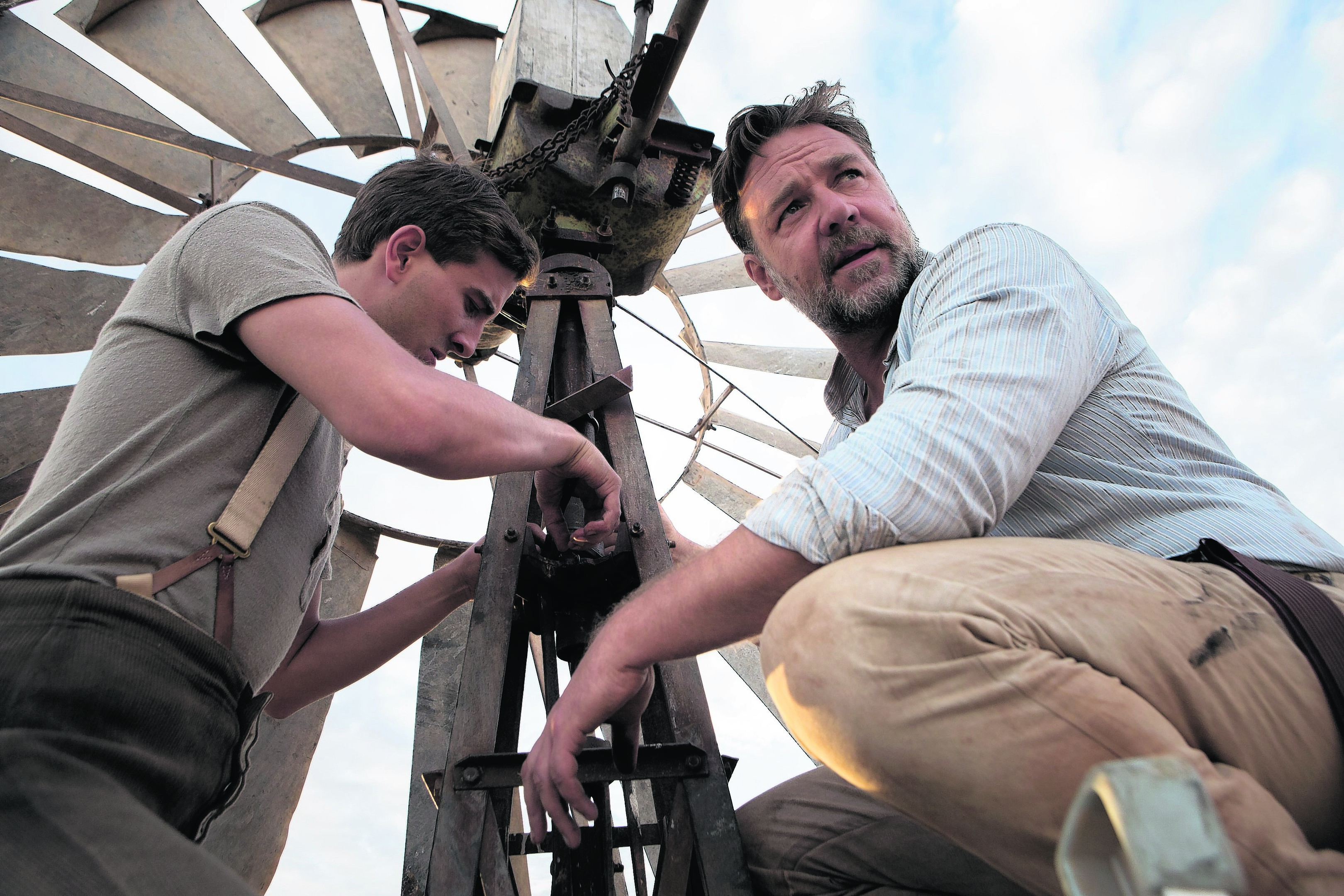Russell Crowe couldn’t give a monkey’s what others think of him. In the age of selfies, and the very real possibility for A-Listers to have their mugs surreptitiously snapped and then splashed across social media, many actors would feel the need to preen for their public, both physically and in what they say.
Russell Crowe is not that man. With a full day of interviews to discuss his directorial debut The Water Diviner (out now), in which he also stars, he is relaxed and prepared for battle in his slouchy black hoodie and jeans – a pack of cigarettes closely at hand for a crafty drag.
“I know so many actors who would freak out about going on a television show with all these grey hairs poking out,” says the 50-year-old, shrugging.
“I haven’t had my eyes done or whatever. I am who I am. I’m totally comfortable in my own skin.”
Comfortable – and defiant. Earlier this year, Crowe sparked controversy when he spoke out about how growing older has changed the roles he considers, and suggested his female counterparts who find it hard to land roles shouldn’t look to play the “ingenue” forever.
He went on to name check Helen Mirren and Meryl Streep (even finding an ally in The Iron Lady star) as shining examples of actors who have continued their success well into their 60s.
“The benefit of being an actor, one of the benefits, is there are always roles to play, whatever age you are,” explains Crowe, who was born in New Zealand but grew up in Australia.
“But it never gets less competitive. I think that’s where some people have a fundamental problem. If they’ve achieved a level of success, then they think that level of success should remain for the rest of their lives, but that’s not reality.”
He had a firm but fair approach to directing on set, insisting on giving his cast and crew proper time off to see their families, and allowing the odd pint or play on one of the Space Invaders or pinball machines he hired for them, in return for giving “their absolute best work” while they were on set.
“Success needs to be constantly nurtured, otherwise it’s a memory of success, if success is important to you,” he adds.
“I’m very ambitious and I want to be working at the highest levels of the business, and if you’re going to do that, that takes effort.”
A firm believer in graft, he clearly enjoys throwing his all into a project.
“Nobody hands you a damned thing in this world,” he continues. “It’s only the fact that you apply energy and effort that will give you that success.
“For me, to say what I said about ageing, I was just turning it back into myself, and saying it would be embarrassing pretending that I’m still some young buck.”
Granted then, Crowe, who has two sons with his estranged wife Danielle Spencer, isn’t one to rest on his laurels.
After a hugely successful career, finding global acclaim in his 30s for his Academy Award-winning role in Gladiator and Bafta win for A Beautiful Mind, he has stepped up to direct The Water Diviner.
Also starring Bond actress Olga Kurylenko, the film is based on a true story of a grieving Australian father, who goes to Gallipoli to find out what’s happened to his three sons, who’ve been reported missing in action in the First World War battle.
“When I’m looking for scripts as an actor, I’m looking for one that I have a visceral connection to; goosebumps, churning stomach, sweating brow, making notes immediately on behalf of the character, correcting dialogue,” he says with a gradual smile.
“And that was happening when I was reading the script for The Water Diviner. But the other thing that was happening, which I’m totally unused to and has never happened before, was where I had a fundamental belief that I was the only person in the entire universe that could tell this story the way it was meant to be told.
“I wanted to be responsible for the story, and I wanted to make sure the story came across to people in the way I was reading it.”
While others might wrangle with the notion of being both director and leading man, Crowe relished the chance to get stuck in.
“Mel Gibson, when he was going to direct his first film, phoned Jodie Foster and said, ‘Right, you’ve directed yourself in a movie before. Any advice?’ And she said, ‘One word’,” he continues, chuckling. “And he said, ‘What is it?’ And she said, ‘Don’t do it!”‘
But that didn’t put Crowe off, who says the transition was a “natural, easy” one.
Working on films, he says, “you learn the things you definitely want to do, other times you learn things that you don’t want to do”.
“I learned very clearly that film is a relentless pursuit, and you have to match the task with an equally relentless energy.”
And just like his well-documented passion for Leeds United and Rugby League, Crowe approaches his fame with an equal level of energy. It’s just that rather than gloat about his lot, he’s fully committed to popping the celebrity bubble.
“Twitter has got nothing to do with egotism; it’s actually got to do with simply communicating,” says the actor, who admits the social network is very useful in putting out his truth, if he feels he’s been misquoted.
“If you’re afraid of your audience and of people, or you don’t like talking to people, that’s another thing, but I don’t have any of those fears.
“I think it’s healthy to de-glamorise what I do. I’ve always been that person that says, ‘You put me on a pedestal, and I’ll find a way to torch that pedestal immediately’.”
